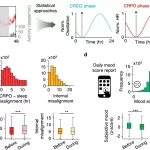A recent study has shed light on a troubling connection between parental emotional abuse and suicide attempts among adolescents, particularly during the COVID-19 pandemic. Conducted by Abigail Lyons, an alumna of the CUNY School of Public Health (SPH), and faculty from the CUNY Institute for Implementation Science in Population Health (ISPH), the research highlights the heightened vulnerability of sexual minority youth.
Published in the Journal of Adolescent Health, the study analyzed data from the 2021 Adolescent Behaviors and Experiences Survey, a nationally representative survey of 7,705 U.S. high school students conducted by the Centers for Disease Control and Prevention (CDC).
Key Findings
The study found that adolescents who experienced emotional abuse from a parent or caregiver were approximately three times more likely to attempt suicide than those who did not report such abuse. The risk was even more pronounced among teens identifying as lesbian, gay, bisexual, questioning, or other (LGBQ). LGBQ adolescents subjected to parental emotional abuse faced nearly ten times higher odds of attempting suicide compared to their heterosexual peers who did not report abuse.
“This signals a need for targeted interventions to address parental emotional abuse and to provide support for at-risk youth, especially those identifying as sexual minorities,” said Abigail Lyons, who currently serves as a project manager at ISPH.
The study also uncovered the widespread nature of emotional abuse during the pandemic. More than half (55%) of surveyed adolescents reported experiencing emotional abuse, defined as a parent or adult swearing at, insulting, or belittling them.
Implications for Mental Health
The research comes amid rising rates of adolescent suicide, a crisis exacerbated by the pandemic’s impact on mental health. Suicide remains one of the leading causes of death among U.S. teenagers, underscoring the urgency of addressing this issue.
“Understanding and addressing parental emotional abuse is crucial to mitigating suicidality among adolescents and improving mental health outcomes for vulnerable populations,” Lyons emphasized.
The authors also called for more consistent monitoring and measurement of exposure to emotional abuse to better inform prevention strategies.
Moving Forward
The findings point to the importance of developing interventions to support at-risk teens and educate parents about the consequences of emotional abuse. Addressing this issue could play a critical role in reducing adolescent suicides and improving mental health outcomes.
For more information, the study can be found in the Journal of Adolescent Health: Abigail J. Lyons et al., Parental Emotional Abuse, Sexual Identity, and Adolescent Suicide Attempts During the COVID-19 Pandemic, DOI: 10.1016/j.jadohealth.2024.10.029.











